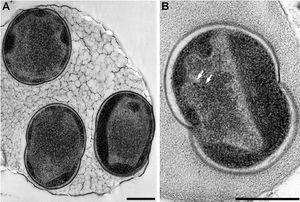Conexibacter: Difference between revisions
Asteinberger (talk | contribs) |
Asteinberger (talk | contribs) |
||
| Line 13: | Line 13: | ||
=Description= | =Description= | ||
Bacteria of the genus ''Conexibacter'' are characterized as small rods with width of 0.6-0.7 um and length of 0.9-1.2 um. They are Gram-positive, aerobic, non-sporulating and are motile by | Bacteria of the genus ''Conexibacter'' are characterized as small rods with width of 0.6-0.7 um and length of 0.9-1.2 um. They are Gram-positive, aerobic, non-sporulating and are motile by characteristic long peritrichous flagella. They have a G+C content of 71 mol% and are catalase and oxidase positive. The type strain of this genus is ''Conexibacter woesei'' named in honor of Carl R. Woese, a pioneer with this work on the use of 16S rRNA for phylogenetic analysis. ''C. woesei'' was isolated from forest soil in Gerenzano, Italy and is known to reduce nitrate into nitrite with optimal growth at pH 7-7.5 and at 28-37ºC. | ||
Revision as of 15:45, 7 May 2015
Classification
Domain: Bacteria Phylum: Actinobaceria Class: Actinobaceria Sub-Class: Rubrobacteridae Order: Solirubrobacteriales Family: Conexibacteraceae Genus: Conexibacter Species: C. woesei (type strain) (DSM 14684), and C. arvalis (DSM 23288)
Description
Bacteria of the genus Conexibacter are characterized as small rods with width of 0.6-0.7 um and length of 0.9-1.2 um. They are Gram-positive, aerobic, non-sporulating and are motile by characteristic long peritrichous flagella. They have a G+C content of 71 mol% and are catalase and oxidase positive. The type strain of this genus is Conexibacter woesei named in honor of Carl R. Woese, a pioneer with this work on the use of 16S rRNA for phylogenetic analysis. C. woesei was isolated from forest soil in Gerenzano, Italy and is known to reduce nitrate into nitrite with optimal growth at pH 7-7.5 and at 28-37ºC.
Ecology and Significance
Genome Structure
Metabolism
References
[1] Monciardini, Paolo, et al. "Conexibacter woesei gen. nov., sp. nov., a novel representative of a deep evolutionary line of descent withing the class Actinobacteria." 53 (2003): 569-576. Print.
Figures
[1F]
[1] [2F] [2] [3F] [3] [4F] [4] [5F] [Original Figure. Author: Pawan Dhaliwal] [6F]
http://microbewiki.kenyon.edu/index.php/File:Lorenzo.gif
[7F] [5]
Author
Page authored by Andrew Steinberger, student of Prof. Katherine Mcmahon at University of Wisconsin - Madison.

